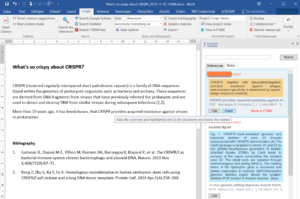This post is also available in:
 Deutsch
Deutsch
F1000 (formerly Faculty of 1000) provides a modern scientific working environment that enables the discovery of important keypapers (F1000Prime), the collaborative development of ideas and writing of manuscripts (F1000Workspace) as well as fast, uncomplicated publishing with Open Access (F1000Research):
F1000Prime
… is a literature recommendation service for biology and medicine (extension to physics and psychology is announced). It is suitable for young researchers who are entering a new subject area or for anyone who wants to quickly find important key articles in another subject area. Over 8000 experts worldwide filter the literature in their field. Important articles are rated and commented with 1 to 3 stars. In addition, these articles are additionally marked with tags such as New Finding, Good for Teaching, Changes Clinical Practice etc., which enables a quick thematic search in the Advanced Search for recommended articles with the corresponding category from the desired subject area:
![]()
With a personal account each search can be saved and alerts can be subscribed.
Alternatively, important articles can also be discovered simply by browsing by faculty and/or by ranking. Recommendations from the last 30 days, which have been published in special journals that are not normally looked through, can be found under Hidden Jewels.
F1000Workspace
… is a modern, web-based working environment on which collaborative ideas and manuscripts can be developed. For full functionality, a browser and a Word/Google Docs plug-in needs to be installed once. F1000Workspace integrates a fully functional literature management software with many import functions (PDFs, EndNote, RIS format, DOIs, PMIDs etc.) and which allows annotating and saving PDFs.
What is special about F1000 Workspace:
- In private and shared projects, topically related references can be managed. This is used to suggest potentially interesting references (from PubMed and Google Scholar) for each project, which can be accepted or dismissed. The more you interact with the suggestion tool, the better it will become.
- In these projects, notes and manuscripts (Word or Google Docs) can be managed and collaboratively edited: The Word plug-in offers conventional functions such as the insertion of citations and the bibliography. There are several thousand styles to choose from.
- The references and notes belonging to the project can be displayed in a sidebar in Word, searched and thus easily inserted into the text.
- In addition, the Word plug-in provides a direct interface to publish in F1000Research.
F1000Research
… is a publishing platform for articles, posters and presentations. The two latter can be submitted easily and free of charge. After a short formal check, they are immediately published on F1000Research, receive a digital object identifier (DOI) and can thus be linked and cited.
After a basic check on each submission to ensure that all policies are adhered to, articles are published in F1000Research within a week and are indexed by Google Scholar. Expert referees are selected and invited, and their reports and names are published in an open peer review process . Articles that pass peer review by two experts are indexed by databases such as PubMed, Scopus and EMBASE.
The article processing charges for F1000 depend on word counts, the UZH publication funding will support with a discount of 10% of the costs. Publications created and submitted via F1000Workspace until the end of June 2019 are 100% free of charge!
F1000, based in London, was launched in 2002 by Vitec Tracz (also founder of BioMed Central) and is supported by an international academic advisory board.


